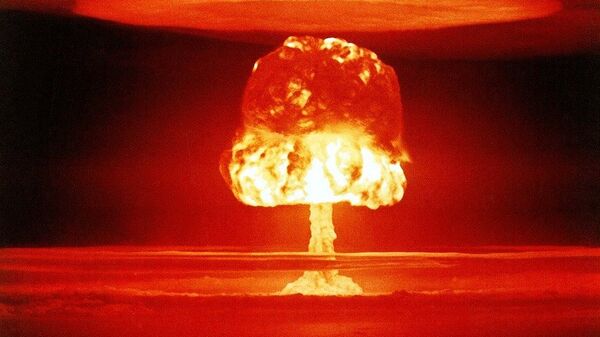The International Campaign to Abolish Nuclear Weapons (ICAN) was awarded this year’s Nobel Peace Prize for “its work to draw attention to the catastrophic humanitarian consequences of any use of nuclear weapons and for its ground-breaking efforts to achieve a treaty-based prohibition of such weapons”.
Rebecca Johnson: We are humbled and honored to be given this award. One of the reasons [we got it] is the way in which ICAN mobilized a new generation of people and, indeed, a new generation of governments to take seriously the problems and dangers attached to nuclear weapons, and the need to get involved to eradicate them. We basically had the governments themselves come to the conclusion that you couldn't have a humanitarian response to any use of nuclear weapons. This couldn't be contained by the borders of any single country, however large, and that the only answer to the dangers of nuclear weapons is to eliminate and abolish them.
The first step had to be a treaty that would prohibit nuclear weapons, and that treaty was negotiated by UN states this year, resulting in the adoption by an overwhelming majority of the UN General Assembly in July and the UN Secretary-General then opening the Treaty for signature in September. [For] that work that we did to raise awareness and with the strategy of prohibiting nuclear weapons leading to their elimination ICAN was given the Nobel Peace Prize. The other part of the equation is that the Nobel Committee … chose to do this wanting to push us further and encourage us and pressure us to go further… It’s just nine states in the world that have these abhorrent weapons of destruction that threaten the peace and survival of all of us, and we have to engage those governments and engage those people in how they are now going to reduce and eliminate their nuclear weapons.
Sputnik: How achievable is the goal of prohibiting nuclear weapons altogether?
Rebecca Johnson: "Of course, it is going to take time. This treaty on the prohibition of nuclear weapons was a major step. There's been 70 years of development of nuclear weapons since they were used in 1945, and it will take time, but it is much closer now than it was. Because the problem was that the existing regime still gave a lot of status and power to those who wield nuclear weapons. This is what woke the world up. This year is when you had a leader like President Trump and Kim Jong-un in North Korea exchanging these bizarre and very dangerous threats to use nuclear weapons and neither of them wanting to blink or back down as happened with the Cuban missile crisis in the 1960s. We now have leaders who think [nuclear weapons] make them big, masculine, macho and powerful. They are actually weak leaders. The only leaders that need nuclear weapons are the weak ones and they posture with them and this is what’s so dangerous. We are also saying that the treaty itself encourages continuation of… other kinds of confidence-building measures, nuclear weapon-free zone, for example, we would like to see some talks about how to do that in Northeast Asia, to involve the six parties – North Korea, South Korea, Japan, the US, Russia and China – and one of the things that could be considered there is a nuclear-free zone by agreement. We also want the continuation of the [nuclear] reduction talks between the US and Russia. They’ve been stalled for a long time, and we want the Comprehensive Test Ban Treaty to come into force. This treaty… is an important step… because it says: these weapons are not just immoral, they are actually illegal. Anyone who threatens or uses nuclear weapons will find themselves held personally liable, however powerful the leader, in The Hague for crimes against humanity and war crimes. Any state, any financial institution, banks – assistance with developing nuclear weapons is part of the treaty's prohibition. So this is what is going to make a difference, but it will take time."
Sputnik: Would the abolishment of atomic bombs bring peace to the world?
Rebecca Johnson: "We've been very clear about this. Humanitarian organizations that have worked on trying to end the arms trade and the reliance on explosive weapons in cities, and landmines, and cluster munitions… We don’t want to get rid of nuclear weapons and make the world a place for more bloody conventional weapon wars. We want [to eliminate] the causes of war, the causes of violence in our societies and the violent use of weapons and also the whole investment, the money that changes hands with the arms trade. We want to tackle all of that and, indeed, most of us at ICAN have been involved for a long time in all aspects of taking militarism out of conflicts and developing diplomatic and political ways to tackle conflicts. There will always be conflicts. There [do] not always have to be massacres, barbarity and murders on the kind of scale that we see, whether the world is armed with nuclear weapons, chemical weapons, landmines, guns, fragmentation bombs, cluster munitions. We do have to tackle reducing all of that weaponry and tackle the causes at their roots."


